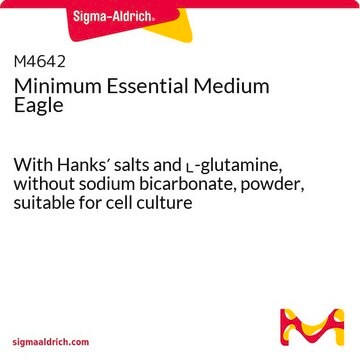51412C
Minimum Essential Medium
with Earle′s Balanced Salts, without L-glutamine, liquid, sterile-filtered, suitable for cell culture
Synonym(s):
Minimum Essential Medium Eagle, MEM
About This Item
Recommended Products
description
for research or for further manufacturing use
Quality Level
sterility
sterile-filtered
form
liquid
technique(s)
cell culture | mammalian: suitable
cell culture | stem cell: suitable
components
L-glutamine: no
NaHCO3: 2200 mg/L
phenol red: 10.62 mg/L
Earle’s salts (5% CO2): yes
storage temp.
2-8°C
Looking for similar products? Visit Product Comparison Guide
General description
Storage Class
12 - Non Combustible Liquids
wgk_germany
WGK 1
flash_point_f
Not applicable
flash_point_c
Not applicable
ppe
Eyeshields, Gloves
Choose from one of the most recent versions:
Certificates of Analysis (COA)
Don't see the Right Version?
If you require a particular version, you can look up a specific certificate by the Lot or Batch number.
Already Own This Product?
Find documentation for the products that you have recently purchased in the Document Library.
Customers Also Viewed
Our team of scientists has experience in all areas of research including Life Science, Material Science, Chemical Synthesis, Chromatography, Analytical and many others.
Contact Technical Service



